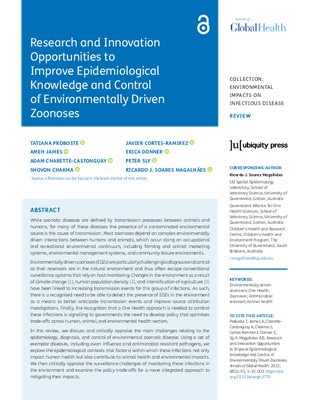Research and Innovation Opportunities to Improve Epidemiological Knowledge and Control of Environmentally Driven Zoonoses
While zoonotic diseases are defined by transmission processes between animals and humans, for many of these diseases the presence of a contaminated environmental source is the cause of transmission. Environmentally driven zoonoses (EDZs) are particularly challenging to diagnose and control as their reservoirs are in the natural environment and thus often escape conventional surveillance systems that rely on host monitoring. This review discusses the main challenges relating to the epidemiology, diagnosis, and control of EDZs.
https://biodiversitylinks.org/learning-evidence/one-health-evidence/one-health-evidence-inbox/research-innovation-opportunities-to-improve-epidemiological-knowledge-and-control-of-environmentally-driven-zoonoses.pdf/view
https://biodiversitylinks.org/learning-evidence/one-health-evidence/one-health-evidence-inbox/research-innovation-opportunities-to-improve-epidemiological-knowledge-and-control-of-environmentally-driven-zoonoses.pdf/@@download/image/image.png
File
Research and Innovation Opportunities to Improve Epidemiological Knowledge and Control of Environmentally Driven Zoonoses
Author(s):
Tatiana Proboste, Ameh James, Adam Charette-Castonguay, Shovon Chakma, Javier Cortes-Ramirez, Erica Donner, Peter Sly, and Ricardo Soares Magalhaes
Publication Date: 2022
DOWNLOAD FILE
While zoonotic diseases are defined by transmission processes between animals and humans, for many of these diseases the presence of a contaminated environmental source is the cause of transmission. Environmentally driven zoonoses (EDZs) are particularly challenging to diagnose and control as their reservoirs are in the natural environment and thus often escape conventional surveillance systems that rely on host monitoring. This review discusses the main challenges relating to the epidemiology, diagnosis, and control of EDZs.



